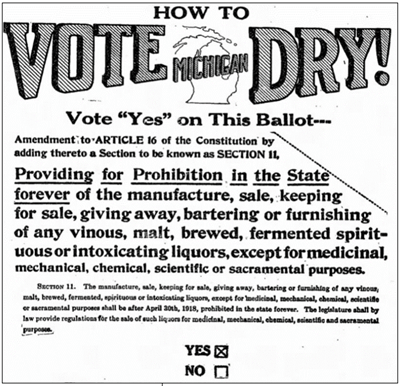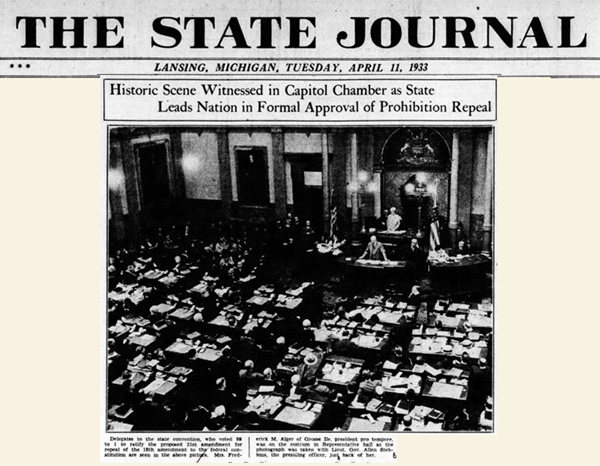Prohibition Era
Michigan had virtually been a dry state by 1911 because most counties had already voted to be dry on their own. On November 7, 1916, Michigan voters approved an amendment to the Michigan Constitution of 1908 that stated the “manufacture, sale, keeping for sale, giving away, bartering, or furnishing” of alcohol would be “prohibited in the state forever”. The amendment went into effect on May 1, 1918.

The 18th Amendment to the United States Constitution was ratified on January 16, 1919 and national Prohibition began a year later on January 17, 1920.
Prior to the 18th Amendment going into effect, Congress enacted the National Prohibition Act in October 1919. This act, introduced by Congressman Andrew Volstead from Minnesota, was commonly called the “Volstead Act” instead of its more formal name. Interestingly, President Wilson vetoed this law when Congress passed it, but the House of Representatives and Senate overrode his veto, which is a very uncommon occurrence with only 4% of Presidential vetoes ever being overridden by Congress.
While the 18th Amendment prohibited the sale, transportation, importation, or exportation of “intoxicating liquors” in the United States, the Volstead Act was the actual federal law that spelled out the specifics of how Prohibition would be enforced from a federal standpoint. Section 2 of 18th Amendment also contained a provision that state governments could also enforce the 18th Amendment through “appropriate legislation”.
Neither the 18th Amendment nor the Volstead Act prohibited the possession or consumption of alcohol by private individuals, but the states could enact tougher laws. In 1927, the Michigan Legislature further enacted laws that made any liquor violation a felony offense and a fourth felony of any kind would result in a life sentence in prison. A Lansing resident by the name of Etta Mae Miller, a 48-year-old mother of 10 children, was arrested in October of 1928 for allegedly selling two pints of homemade moonshine. This was her fourth offense and she was sentenced to life in prison. The case made national news and the Governor ultimately commuted her sentence in 1930.
Michigan Plants the Seeds of Repealing Prohibition
On November 8, 1932, the voters of Michigan went to the polls once again to amend the Michigan Constitution of 1908 by repealing the prohibition language approved sixteen years earlier. The amendment also allowed for the creation of the Michigan Liquor Control Commission:
The legislature may by law establish a liquor control commission, who, subject to statutory limitations, shall exercise complete control of the alcoholic beverage traffic within this state, including the retail sales thereof; and the legislature may also provide for an excise tax on such sales: Providing, however, that neither the legislature nor such commission may authorize the manufacture or sale of alcoholic beverages in any county in which the electors thereof, by a majority vote, shall prohibit the same. Article XVI, Section 11 – Michigan Constitution of 1908
While the Michigan Constitution no longer contained language prohibiting alcohol in the state, the United States Constitution and federal law still made Prohibition the law of the land, but that would quickly change. In late March 1933, the Cullen-Harrison Act amended federal law and legalized beer and wine with an alcohol content of 3.2% or less.
Michigan was the very first state in the nation to vote in support of ratifying the 21st Amendment on April 10, 1933, starting the process of repealing national Prohibition.

Birth of the Michigan Liquor Control Commission and the End of Prohibition
Several days after Michigan voters overwhelmingly voted in favor of the 21st Amendment, the Michigan Legislature passed a law that allowed for the manufacturing and sale of beer and wine in Michigan. The Governor signed the bill on April 27, 1933 and the newly minted Public Act 64 of 1933 legalized beer and wine sales in Michigan once again. The alcoholic content of the beer and wine allowed under the law was limited to a very low 3.2% as provided under the federal Cullen-Harrison Act. The law created specific license types for retailers to sell alcohol and allowed local governmental units to vote to legalize alcohol sales in their territories or to remain dry. The act also created the Michigan Control Commission, as allowed by the 1932 Constitutional amendment. The original Commission consisted of seventeen members – one from each Congressional district – all appointed by the Governor, and only nine members could be from the same political party. By the second week of May 1933, beer and wine were once again being sold and served legally to thirsty Michiganders.

When finally ratified by Utah on December 5, 1933, the 21st Amendment to the United States Constitution repealed the 18th Amendment and nationwide Prohibition officially ended.
During a specially called legislative session at the end of 1933, the Michigan Legislature passed the Michigan Liquor Control Act, which greatly expanded upon the law passed in April 1933 and allowed for the manufacturing, sales, and service of beer, wine, and spirits. The Governor signed the law into effect on December 15, 1933 and it became Public Act 8 of 1933 (Ex. Session). The new law repealed multiple sections of Michigan’s existing law enacted during Prohibition and also repealed Public Act 64 of 1933, which was passed earlier in 1933. The composition of the Commission changed considerably under this act and now consisted of five members – three members from one political party and the other two from another political party. Furthermore, the Governor and Secretary of State served as ex officio members and could vote on Commission business.
The Michigan liquor law has seen many changes since 1933, but the composition of the Commission has remained at five members since that time. The Governor and Secretary of State were eventually removed as ex officio members and today are not members of the Commission and have no vote. In 1998, the much-amended Michigan Liquor Control Act was replaced by the new Michigan Liquor Control Code, which remains the current law.


